The Best Free VPNs for the USA in 2025 (For US IP Address)
Over the last couple of years, Virtual Private Networks (VPNs) have become popular around the world. So much so that it feels like almost everyone has one on their device. With the number of VPN providers increasing sporadically, it is difficult to single out one that offers the best features.
In this article, we’ll take you through the best free US VPNs and give you invaluable tips when using any of the VPNs in the country.
Do Free VPNs work in the US?
With some VPNs requiring a fee, and the others being free, you may be wondering if you should go for the latter option. The thing is free VPNs most often do not work in the US. Instead, we recommend you go for a paid VPN. Many of them are cheap and have a 30-day money-back guarantee, so you’ll be getting them essentially for free or risk-free.
Best risk-free VPN to use in the US
Risk-free VPNs are not free, and the best one to use in the US is ExpressVPN.
ExpressVPN
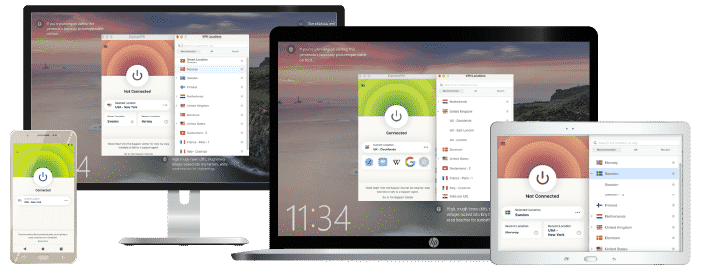
Features
- Number of servers: More than 3,000
- Speeds: Unlimited
- Server locations: 160 in 105 countries
- Maximum devices supported: 8
- 24 live chat: Yes
- 30-day money-back guarantee: Yes
Pros/Cons
- Fastest VPN out there
- Strict no logs policy
- 256-bit AES encryption
- Slightly more expensive than others
ExpressVPN is perhaps the most popular VPN for US users, and it is crystal clear why the VPN service is the preferred choice. ExpressVPN is the ideal VPN provider to escape geo-restrictions while offering privacy and security.
ExpressVPN has 160 server locations in 94 countries. On every one of these servers, you’ll have unlimited bandwidth to browse and surf the internet at will. They also have ultrafast speeds, so you’ll not likely experience a dip in your network while you browse with the VPN – talk about speed and versatility. The VPN service is very convenient to use in the US.
This VPN service is also compatible with every device. As an award-winning software, you’ll have no trouble connecting to a Windows, Mac, iOS, Android, or Linux device. But that’s not all. You can also use it on game consoles and smart TVs. On any device you decide to use ExpressVPN, you are assured of the best-in-class encryption that’ll protect you from malware, viruses, and hackers. The VPN operates on a no-log policy and adds several security levels, like split tunneling, that makes it impossible to break the network.
The icing on the cake is that ExpressVPN has a 30-day money-back guarantee, which is the reason we have placed it as the best risk-free VPN. No free VPN provider can contest with this VPN service.
- Pros: Fastest VPN out there; Strict no logs policy; 256-bit AES encryption;
- Lowest price: $4.99
Best completely free VPNs
Here are the four completely free US VPNs to use:
ProtonVPN
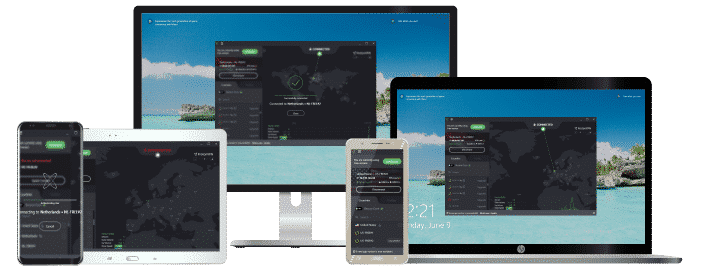
Features
- P2P support? Yes
- 30-day money-back guarantee? Yes
- Country of origin? Switzerland
- Servers: 11,000+ in over 110+ countries
- Simultaneous devices: 10
Pros/Cons
- Professional support
- Modern interface and apps
- AES-256 encryption
- Lesser known provider
ProtonVPN is up there with the big boys in the VPN industry. Initially, it was only a paid VPN, but there’s now a free version for you to use. The free version is decent enough, but you’ll be missing out on a lot by not switching to the paid version.
ProtonVPN, on both its free and paid versions, provides top-notch security and privacy features that’ll make using it a wonderful experience. It is on these two features that ProtonVPN cements its position as one of the best providers of free VPN services.
The free ProtonVPN version has no speed or data limits, so you can watch as much content as you like from many sites. Unlike other free VPNs, ProtonVPN blocks adverts, so that you can enjoy a better internet experience. And to crown it up, all your activities with this VPN service is protected by Swiss privacy laws.
Comparing the features of the free and paid versions of this VPN should incentivize you enough to make the change. On the free version, you can only connect with one device while you are allowed two, five, and ten in the basic, premium, and visionary accounts, respectively. Another downside is that you are constrained to using the free version in only three countries, while all other plans allow you to connect from any country. The server speeds in the free type is also an issue, with the official ProtonVPN website labeling it as medium.
The free and paid versions of ProtonVPN work on Windows, PC, Mac, Linux, iOS, and Android devices.
- Pros: Professional support; Modern interface and apps; AES-256 encryption;
- Lowest price: €4
Trust.Zone
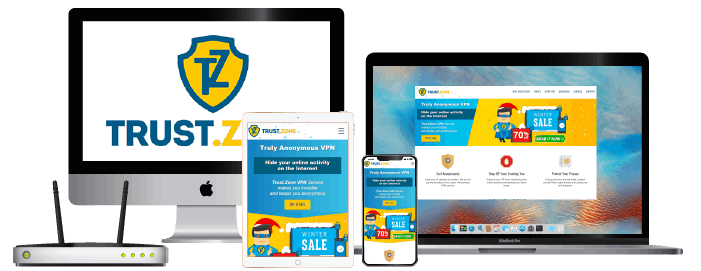
Features
- Complete anonymity? Yes
- Unblocking of all websites? Yes
- Pricing options: 4
- Servers: 164 in 80+ zones
- Free trial: Yes
Pros/Cons
- Military grade encryption
- Bitcoin accepted
- App for mobile devices
- Lesser known provider
Another VPN provider that works really well in the US is Trust.Zone. Its four fundamental features have made us include it in this list.
Trust.Zone prevents your ISP from monitoring your activities when online. You can download any file, stream any content, or play games without having to worry about prying eyes. The VPN service does this using the state-of-the-art log encryption as well as added layers of security. In the US, Trust.Zone has servers in five zones. This gives you freedom when selecting a server.
Trust.Zone also unblocks any site easily. It bypasses internet filters and overcomes censorships so you can do anything you like on the web. You can get the VPN for free for three days, after which you’ll have to upgrade to the paid version.
- Pros: Military grade encryption; Bitcoin accepted; App for mobile devices;
- Lowest price: €3
HotspotShield
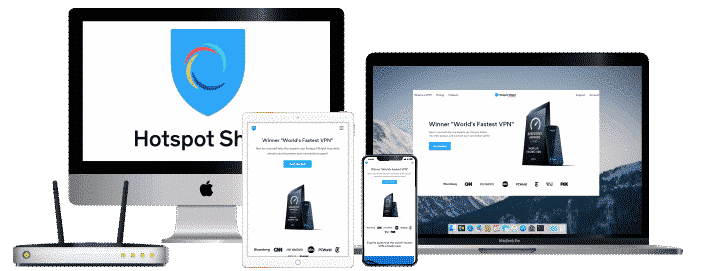
Features
- Unlimited data? Yes
- Simultaneous connections: 5
- Military grade encryption? Yes
- Servers: Over 3200 in 80+ countries
Pros/Cons
- Unlimited HD streaming
- Blocks malware
- 256-bit AES encryption
- Unreliable support
We reckon that Hotspot Shield is one of the best completely free VPNs to use in the US. Like ProtonVPN, this VPN service has two options; one which is free and the other paid. The interface in this security-focused VPN is very easy to use, which is one of the many reasons why it has a place on this list.
On the free Hotspot Shield plan, you can protect five devices simultaneously. However, you are limited to only 500MB of data per day, which is about 15GB in a month. This is a decent amount, and not as restrictive as what other VPNs provide. The VPN service boasts of the best military-grade encryption in the AES 256, which makes sure your data and logs are secured. You’ll also get a limited number of servers in only a few locations that the VPN service will choose for you.
- Pros: Unlimited HD streaming; Blocks malware; 256-bit AES encryption;
- Lowest price: $6.99
Windscribe
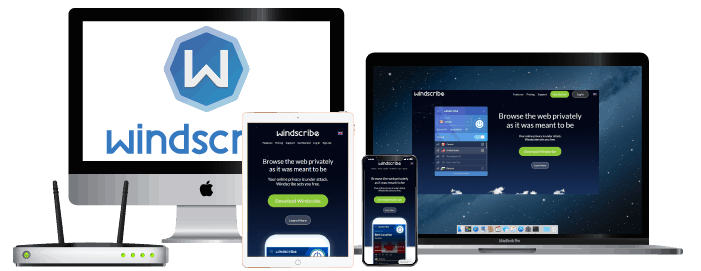
Features
- Browser extension? Yes
- Pricing options: 3
- Free trial: No
- Unblocking of all websites? Yes
- Locations: Servers in 60 countries
Pros/Cons
- Military grade encryption
- Available on all major platforms
- App for mobile devices
- Lesser known provider
A newbie to the VPN world that is making a ground-breaking success is Windscribe. The service has impressive data allowances, and a commitment to protecting your privacy while you browse, stream, or play games in the US.
Windscribe doesn’t keep logs of visited sites or IP stamps of its users, and to connect, you only need a username and password. With the free version working excellently in the US, you’ll have all you need to use the internet without restrictions. Windscribe has features for browsers, a desktop version, and a mobile app. In all of these, you’ll get 10Gb of data in a month when using the free version.
Windscribe is an impressive VPN that has most of the features users need in one.
- Pros: Military grade encryption; Available on all major platforms; App for mobile devices;
- Lowest price: $4.08
How to Pick a Free VPN
The five questions to ask yourself before installing a free VPN are;
- What is the policy of the VPN provider? No one provides services because they like customers. Indeed, there’s always an incentive, with cashing out being the usual one. If the policy of a free VPN is to collect data from you behind the scenes, then think twice before you pick such providers. You should go through the reviews and testimonials of other customers to get a clearer picture of the services that a free VPN provides.
- How does the VPN protect my device? There are so many ways to protect your device with a VPN. Encrypting your traffic while you surf takes care of only part of the problem. A holistic approach will work better in concealing your data and traffic. Therefore, pick free VPNs that offer several layers of security over others.
- What do I lose when I opt for a free VPN? Many VPNs have a free and paid version. While the thrill of not paying to enjoy great VPN services is hard to resist, there’s always more to gain in going for paid VPNs. Major features like security, privacy, and sometimes speed may be the same in both versions, but the server quantity and locations are surely going to be different.
- What do I need to sign up? The best you can get online is a VPN that allows you to subscribe without requesting an email address or one that accepts cryptocurrencies.
- How fast is its speed? You cannot use a slow VPN to surf the internet. Even though the preferred connection speed is relative, faster VPNs will always be everyone’s top choice. Under no condition should you go for a VPN that throttles your connection. They will leave you frustrated.
- Is there customer support in place? VPNs are fairly easy to use, but if you are new to them, you can make some wrong turns once in a while. Ensure that the VPN you decide to get has a customer support system that’ll be willing to respond to your issues all day long.
How do free VPNs work?
It’s pretty much the same way paid VPNs work. Your data is sent through a server when you connect your device to it. The VPN service then works by encrypting your data, which creates a tunnel that separates your traffic from that of other users. The encrypted data travels in this form until it gets to exit nodes. But it’s not only your data that is encrypted while en route. Information about the sender and recipient are also encrypted.
Protocols are the methods that protect your information while it travels to its intended recipient. Today, the popular VPN protocols are Internet Protocol Security (IPSec), Internet Key Exchange Version (IKEv), OpenVPN, and Layer 2 Tunnelling Protocol (L2TP).
Setting up a VPN for use
Follow these steps if you are just starting out with VPNs and wondering how to set one up.
- Check for instructions from the VPN service provider. A lot of them have apps that you can download from your app store, while a smaller number have browser extensions. It’s a fairly easy process to follow, as most VPNs make user-friendly interfaces. Ensure that you know how to delete and uninstall such apps if you find the service unsatisfactory later on.
- In rare cases, you might have to set up your VPN manually. It is a straightforward process as well, and you can customize settings that way. Remember that no good VPN should request for information they don’t need to open an account.
- Once your VPN is installed, you should test to see how it works, and whether it is what you need. Try seeing a movie or a video online, and watch out for speed drops or connection problems. If you have any issues, be sure to contact the customer support representative of the VPN service.
Difference between a VPN and a Proxy server
Many people get confused and think Proxy Servers are the same as VPNs. This is not true. The major similarity that these two have is that they mock IP addresses to seem like they are coming from a different location. This is where the similarity ends.
Proxy servers don’t encrypt or provide tunneling. This means that they will keep you anonymous, but your data may not be protected. A VPN, on the other hand, provides both encryption of data and anonymity of its users.
Is it legal to use a VPN?
VPNs are legal in most countries, and in the US, they are becoming more important than ever. Net neutrality has put chains on how users can surf the internet, and your Internet Service Provider (ISP) can sell your data or block you from accessing some sites.
With that being said, because a VPN is considered legal in many countries doesn’t mean you should use it for malicious activities. Some illegal ways of using a VPN include;
- Spreading internet malware and viruses
- Copyright, patent, and trademark infringement
- Hacking other networks or computers
- Trading on the dark web
- Cyberbullying and Cyberstalking
In Conclusion
VPNs are excellent tools you can use with other programs for a better internet experience. There are so many types out there, so we’ve helped you out by including the best free ones in the US. We’ve also included some tips that’ll help you when using a free VPN. We recommend you stick to one, instead of using several at a time. Happy surfing!